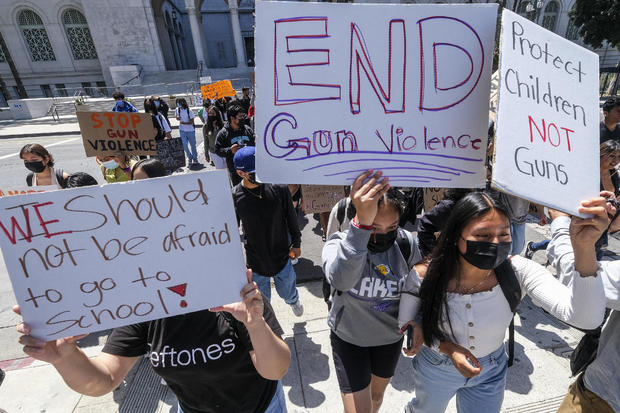

Writing for the majority in 2008's Heller v. District of Columbia, which involved D.C.'s handgun ban, Justice Antonin Scalia noted a rise in handgun violence nationwide and said the Constitution leaves the government a "variety of tools for combatting that problem, including some measures regulating handguns," but the court provided little guidance as to what gun restrictions are constitutionally permissible. Since then, the 2008 decision is often cited by both sides of the gun control debate — as a reason against enacting new firearms regulations and as the reason why gun violence has continued to rise in the U.S. Nelson Lund, a law professor at George Mason University who is an expert on the Second Amendment, said the forthcoming ruling in the New York legal fight could allow the court to clear up uncertainties left after the Heller decision. "There are so many questions left unanswered by Heller, and ever since that case was decided in 2008, people have been arguing about what it implies," he said. "You can make arguments on both sides because Heller was written in a way that allowed people to do that." Lund noted that a decision from the high court voiding New York's concealed-carry licensing framework could jeopardize regimes in other states — at least six allow a person to carry a firearm in public only if they demonstrate a need to do so — though that raises the question of what law then could replace those rules.
"They could write an opinion that basically has very little effect beyond invalidating this particular statute, or they could also write an opinion that gives a lot of guidance about how far state and local governments may go," he said. Amid the wait for the Supreme Court's decision in the challenge to New York's limits, the mass shootings in Buffalo and Uvalde have spurned new attempts by elected officials at the state and federal levels to change laws to curb gun violence. In Texas, Gov. Greg Abbott, a Republican, said the state "must reassess the twin issues of school safety and mass violence" and requested state legislative leaders convene special legislative committees to develop recommendations on issues to prevent future school shootings, including mental health and gun safety. And in Congress, a bipartisan group of senators has been meeting this week to find common ground on new firearms laws. Sen. Richard Blumenthal, a Democrat from Connecticut, said in a statement Wednesday that he and Sen. Lindsey Graham, a Republican from South Carolina, are working through details of a measure focusing on "red flag" laws , which allow courts to order the confiscation of firearms from those threatening to harm themselves or others. He is also discussing with senators a plan for the safe storage of firearms. Sen. Susan Collins, a Republican from Maine who is also involved in gun control talks, said negotiators are "making rapid progress toward a common sense package" that could garner bipartisan support. The House Judiciary Committee is meeting to consider eight different gun control measures that together will be packaged as the "Protecting Our Kids Act" and taken up by the full House next week. Among the bills are plans to raise the minimum purchasing age for semiautomatic rifles from 18 to 21, ban large-capacity magazines and establish requirements regulating the storage of firearms on residential facilities.
Any legislation that clears the House, though, must be able to garner 60 votes to advance in the evenly divided Senate. Senate Majority Leader Chuck Schumer has blessed the attempt at bipartisan negotiations to reach consensus on laws to reduce gun violence, but he warned last week that the Senate will proceed with a vote on gun control legislation in the near future even if the talks fail. Meanwhile, Senate Minority Leader Mitch McConnell said during an event in Kentucky on Wednesday that the discussions are meant to "see if we can find a way forward consistent with the Second Amendment that targets the problems." But Blocher said the failure by Congress to enact new limits on firearms has more to do with politics than constitutional bounds. "Politically, we are nowhere near the limits that the Supreme Court has set out. In Heller, the Supreme Court made clear that a potentially wide range of gun regulations are perfectly constitutional, and thus far we have for political reasons not taken advantage of that, whether it's expanded background checks or extreme-risk laws or other possibilities as well. The [New York] case could change that, but I expect the court will recognize gun rights and regulations can go hand-in-hand like they have for all of American history," he said. "The greatest obstacle to gun regulations in the United States is political, not judicial."
Supreme Court won't let Green Party candidate Jill Stein on Nevada ballot
Arizona Supreme Court rules those affected by database error can still vote